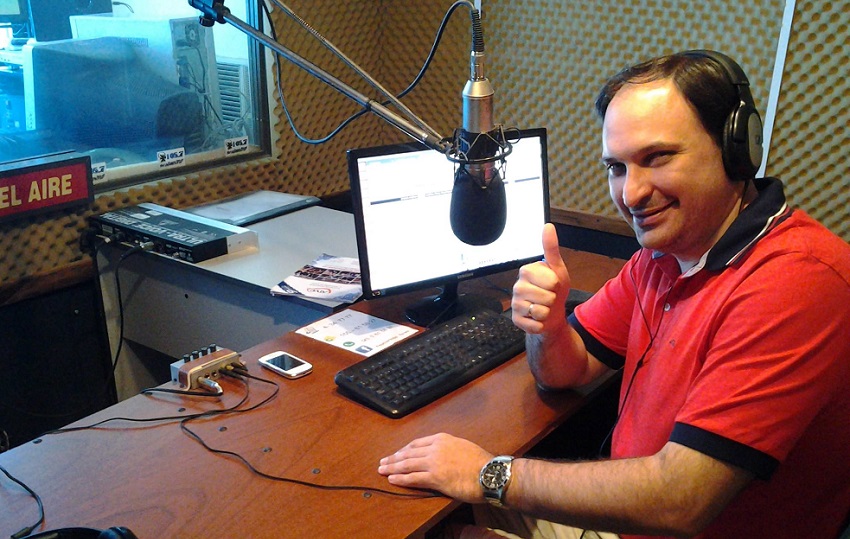Joseba Etxarri. It is not every day that a Basque radio program celebrates its Silver Anniversary, but that is the case for Presencia Vasca weekly radio show that has fulfilled the need for 25 years on the air, now also online, to share news, music, feelings and announcements for the Basques in the area. Federico Borras Alcain is from Parana, a lawyer, journalist, and on his Basque side, has served for more than a dozen years as the president of the Urrundik Basque Argentinean Association in Parana, where he also served as a txistulari and dantzari. He is the director of the Presencia Vasca radio program that is broadcast from the local University Radio station.
Zorionak, congratulations…
-Thank you, eskerrik asko…
Presencia Vasca has entered into history of Basque radio broadcasting. Was it hard to get here?
-We have seen it all. It’s possible that there have been rougher times, but there is no doubt that it has been overall very positive. The pitfalls that we have experienced were overcome. How many of us working in Basque things haven’t had to, at one time or another, volunteer even donating from our own pocket towards projects and activities so that they could continue? Beyond the daily problems is the satisfaction of being able to contribute and making it possible for others to do the same, to contribute to maintain our identity and our ancestral culture.
In your case, your grandfather, Raul Alcain, was the person who introduced you to Basque things.
-My grandfather was always very close to it. Our family was born here for generations but he was deeply rooted in his sense of belonging. Even later on, he participated in 1987, at the age of 75 in the Second World Basque Congress and he brought me a plastic txistu back as a present. I studied the instrument on my own and then took some lessons from Guillermo Canut, from Rosario, and after being mainly self-taught, I became a txistulari, and before a dantzari. I remember when I was 10 or 11, my grandpa took me too the first Basque club which he and others had re-founded shortly before in order to organize a dance group.
You began Presencia Vasca togehter in 1990
He began it, and I was his helper, I was 15 at the time. He directed the program until I took over. He died at the age of 96 and has always been our family's inspiration especially when it comes to things Basque.
You went to the Basque Country for the first time in 1996.
-I went for the first edition of the Basque Government’s Gaztemundu program. We got together with Basque youth from various countries and many of us of us had ever been to the Basque Country, only in our dreams. I remember when the airplane was approaching Sondika, looking excitedly through the window, and I realized that the girl next to me was also emotional, crying. The trip, all that I saw and learned, strengthened by convictions about the Basque Country and its people.
25 years of radio must have brought with them many changes, especially regarding technology.
-At first our audience was located in the cities of Parana, Santa Fe and a little more. Today, they listen to us on the internet and our reach and the facilities to access news, music, etc. are without compare. During many years news came to us via newspapers that took months to reach us. We always tried to transmit a positive image of the Basque Country, really idealizing it, because negative things already existed in other media. It was more about transmitting our feelings, because for me, Euskal Herria, Euskadi, is a marvelous place. Something that I always enjoyed was people listen to us that have nothing to do with Basque, just because of the comments or because of the music.
Another 25?
-Just like now, little by little. I’m an optimist. Today there is no more Basque emigration. In the case of the Province of Entre Rios, that stopped in the beginning of the 20th century. But even without emigration we still emerged, for example, and new clubs continue to emerge. This doesn’t happen in other communities, like Italian, Spanish or Volga Germans. On the other hand, we see that people, who are not of Basque descent, seek us out and join us. We have young people and that is our challenge. In Argentina there is a lot of sympathy for the Basques, but if we don’t know how to channel it, it will fade. As professor Mikel Ezkerro says, we have to strengthen the feeling with knowledge.






 Send to a friend
Send to a friend Add comment
Add comment








